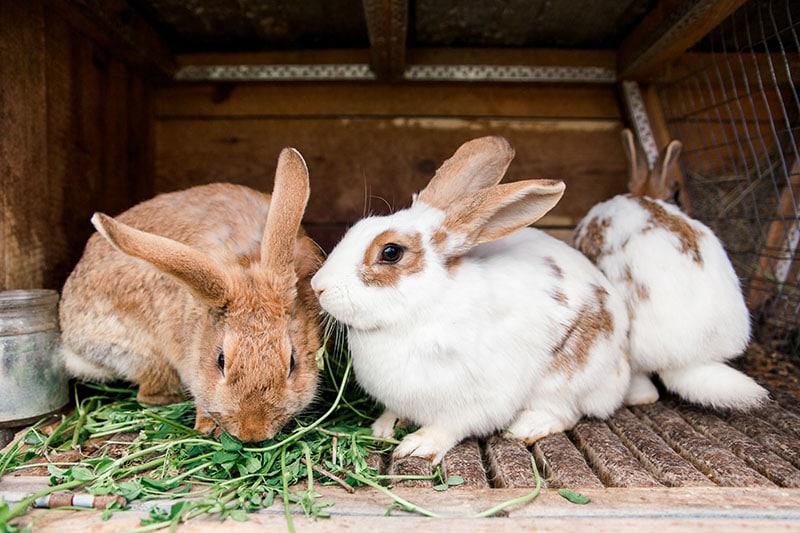
Rabbits are among the most popular four-legged furry pets and are known for being intelligent, affectionate, and quite social. But rabbits have very sensitive digestive systems, meaning they have unique dietary needs that must be followed to keep them healthy and happy. The diet you feed your rabbit has effects on their teeth, gut microflora and behavior and so it is very important that they get the right nutrition.
Rabbits can easily fall ill and even die if they are introduced too quickly to new foods or are fed something inappropriate, so knowing what foods are and are not appropriate is key to successfully raising rabbits.
When it comes to rice, rabbits should not be allowed to eat it regardless of what kind it is. Keep reading to learn more about why rice should be avoided in your rabbit’s diet and how to feed them a well-balanced diet.
Why You Shouldn’t Feed Rice to Your Rabbit
Rabbits are highly sensitive to changes in their regular gastrointestinal bacteria, leading to a condition known as GI stasis which results in the slowing of the passage of food through the GI tract. If left untreated, severe cases of GI stasis can be fatal.
A common reason why rabbits experience GI upset is from eating too many carbohydrates and too little fiber. Considering rice is incredibly high in starch carbohydrates and relatively low in fiber rabbits are unable to properly digest it.
Rabbits do not need to eat grains. Feeding your rabbit rice, whether white or brown, cooked or uncooked could very easily cause stress on the digestive system and lead to many signs of GI stress and open up the potential for GI stasis.

What Should Rabbits Eat?
Good quality hay and grass should make up the majority of your rabbit’s diet. This can be supplemented with leafy greens and a small amount of pellets. High-quality grass hays such as timothy hay, orchard grass hay, or bromegrass hay should always be available. These grass hays are rich in fiber, which is crucial for rabbits to maintain a healthy digestive system. Rabbits teeth also continuously grow so need to be worn down and kept at the correct length by eating grass, hay and leafy green plants.
Some recommended leafy greens for rabbits include: spring greens, bok choy, dandelion greens, kale, cilantro, watercress, carrot tops, basil, beet greens, and broccoli greens. Root vegetables such as carrots and fruit should be fed as treats in small amounts. Rabbits don’t naturally eat these types of food in the wild. Always avoid sudden changes to your rabbit’s diet and introduce new vegetables slowly. Do not feed lawnmower clippings as this can also upset a rabbit’s digestive system and make them unwell.
For commercial rabbit pellets, follow the manufacturer’s feeding guidelines and be sure not to overfeed them as this may mean that your rabbit doesn’t eat enough hay or grass . Growing, underweight, pregnant or nursing rabbits may need larger portions.

How Often Do Rabbits Need to Be Fed?
These cute little herbivores are considered grazers, meaning they eat continuously throughout the day. Rabbits should have access to hay and fresh clean water at all times. They can also be offered a moderate amount of fresh, leafy green vegetables and an appropriate portion of pellets once daily.
Do Rabbits Need Any Additional Vitamins?
Rabbits do not require vitamin supplementation, as they should be getting their nutritional needs from their diet, which is why they need a diet that is varied and rich in fiber.
Can I Offer Treats to My Rabbit?
Rabbits can be offered treats sparingly, but you must avoid overfeeding to avoid obesity and digestive issues. You should always check with your veterinarian before offering any new foods and discuss the best types of treats to offer your rabbit.

Can My Rabbit Eat Fruit?
Fresh fruits that are high in fiber can be fed in very limited amounts. Always check with your veterinarian before doing so, as fruits are also high in sugar content, which could upset the GI tract if fed in excessive amounts.
Conclusion
Rabbits should never be fed rice. These animals have incredibly sensitive digestive systems and eating rice and other inappropriate foods could lead to an imbalance in normal gut bacteria, causing a condition known as GI stasis, which can be fatal if not treated. It is important to know and understand the specific dietary needs that rabbits require so that you can keep them as healthy as possible.
Featured Image Credit: ZouZou, Shutterstock








